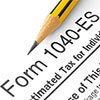YOU MAY NEED TO MAKE ESTIMATED TAX PAYMENTS

You may have to make estimated tax payments if you earn income that's not subject to withholding, such as income from self-employment, interest, dividends, alimony, rent, realized investment gains, prizes and awards.
You also may have to pay estimated taxes if your income tax withholding on salary, pension or other income isn't enough, or if you had a tax liability for the prior year. Please consult a professional with tax expertise regarding your individual situation.¹
How to Pay Estimated Taxes
If you are filing as a sole proprietor, partner, S corporation shareholder and/or a self-employed individual and expect to owe tax of $1,000 or more when you file a return, you should use Form 1040-ES, Estimated Tax for Individuals, to calculate and pay your estimated tax. You may pay estimated taxes either online, by phone or through the mail.²
How To Figure Estimated Tax
To calculate your estimated tax, you must include your expected adjusted gross income, taxable income, taxes, deductions and credits for the year. Consider using your prior year's federal tax return as a guide.
When To Pay Estimated Taxes
For estimated tax purposes, the year is divided into four payment periods, each with a specific payment due date. If you do not pay enough tax by the due date of each of the payment periods, you may be charged a penalty even if you are due a refund when you file your income tax return.
Generally, most taxpayers will avoid this penalty if they owe less than $1,000 in tax after subtracting their withholdings and credits, or if they paid at least 90% of the tax for the current year, or 100% of the tax shown on the return for the prior year, whichever is smaller.
